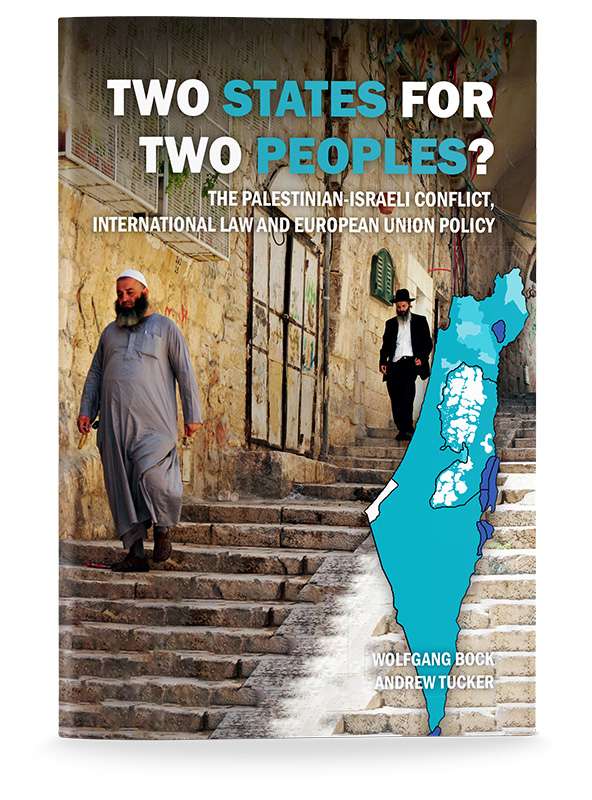A new report published by The Hague Initiative for International Cooperation (thinc.) challenges the legal, historical and political assumptions underlying the two-state policy.
The report, authored by Wolfgang Bock and Andrew Tucker, is entitled Two States for Two Peoples? The Palestinian-Israeli Conflict, International Law and EU Policy. It was launched at an event in the European Parliament in Brussels on 7th December 2022.
For four decades, the European Union has advocated the establishment of a Palestinian state in East Jerusalem, the West Bank and Gaza Strip as the only possible solution to the Palestinian—Israeli conflict.
This policy has failed the test of history.
Despite a half-century of strenuous EU efforts, expending tens of billions of euros, the reality is that there is no independent, democratic, sovereign and viable Palestinian state. Instead, major Palestinian organizations continue to promote the destruction of Israel and reward killing of Jews. Democratic institutions of government are lacking; the Palestinian society is radicalized and violent. The Oslo process has terminated. The security risks mean that Israeli withdrawal from East Jerusalem and the West Bank is totally unrealistic.
This Report suggests a new way forward, consistent with legal, historical and political realities.
Reasons for failure
The report argues that the EU two-state policy has failed because it is based on three false assumptions: a) conceptually, that the Palestinian—Israeli conflict is territorial and not existential; b) legally, that the West Bank belongs to Palestinians for their State; and c) practically, that the establishment of a peaceful, democratic fully-fledged Palestinian state beside Israel is feasible. This discussion paper critiques these assumptions and makes recommendations for a new approach.
Palestinian rights to self-determination must be respected, but they may not conflict with international law, or be allowed to undermine Israeli sovereignty or regional stability. A successful settlement of this conflict can only be achieved within the framework of a consistent application of international law. Peace will never be achieved through agendas aimed at annihilation and destruction. The necessary conditions are: mutual rejection of extremism and mutual acceptance on both sides; the fair and equal application of international law to all actors in the region; and strengthening institutions of government based on the rule of law.
End Palestinian rejectionism
First, the EU must acknowledge the reality that all relevant Palestinian political organizations—including the Palestinian Liberation Organization and the Palestinian Authority that represent and govern the Palestinian people—aim not to establish an independent and viable state side-by-side with Israel, but to destroy the Jewish state. This reflects their ties with extremist actors in the region, such as Iran. Unless the actual goals of these organizations change they will not accept any solution allowing the existence of the State of Israel. Neither will Israel accept any solution that compromises its secure existence as a Jewish state free from hostile acts or threats of force by foreign states and non-state actors. Addressing this root cause of the conflict should be the highest priority.
If the Palestinians accept the Jewish people as a nation, and the right of the Jewish State of Israel to exist as a state free from hostile acts or threats of force, peace has a chance. Developments in the region show that this is possible, but the obstacles to be overcome are significant.
Interpret and apply international law equally in the region
Second, the EU’s assertion that the Palestinians have a right to statehood in East Jerusalem and the West Bank is based on a unique and incorrect reading of international law that the EU does not apply to any other comparable conflict or occupation. The rule of law requires the EU to interpret and apply international law concepts of statehood, territorial sovereignty, self-determination and occupation fairly, objectively and consistently to all actors in the region, including Israel and the Palestinians.
The Palestinians have a right to self-determination (including autonomy), but not an à priori right to a full-fledged state. The EU must also acknowledge Israel’s legitimate territorial rights in these territories, and treat the Palestinians no differently than all other people groups.
Establish the conditions of statehood
Third, the EU’s interventions on the ground ignore the power structures in the region, and political culture within the Palestinian society. Instead of promoting peaceful relations and cooperation, EU support of Palestinian institutions is entrenching corrupt autocracies and promoting extremism and radicalization within the Palestinian society.
Internal structures must be developed that promote equal freedom and security for all citizens founded on the rule of law. The Palestinian political culture must be reformed. This is a long-term project. Such an approach is consistent with EU values; the EU cannot support the creation of an entity dominated by the same extremism and oppression of human rights the EU opposes everywhere else.
Therefore, European financial aid should be conditional on the performance of benchmarked requirements in three main areas: a) cultivation of fundamental values that protect the rule of law, and the civil, religious, and political rights of everybody; b) encouragement of personal liberty and equality, including acceptance of Jews as equal members of society; and c) normalization of relations with Israel along the lines of other agreements with Israel such as the Abraham Accords.

About the authors:
Prof. Wolfgang Bock studied Law and Political Science at the Universities of Geneva, Giessen and Frankfurt/Main. After his secondment in 2011/2012 to the Hessian State Office for the Protection of the Constitution in Wiesbaden (special fields: Islamist extremism and Islamist terrorism), he worked from 2012 till his retirement in September 2017 as Counsellor for Constitutional and International Law at the Federal Academy for Security Policy, an institution of the German Gov- ernment educating people from ministries, security administrations and from economy on all questions of Security Policy, covering the Near and Middle East and Islamic cultures. He writes and teaches on Constitutional Law und Security Law, on Islam, Islamic Cultures and Islamism, and on Policies and Legal Cultures in the MENA region.
Andrew Tucker is a graduate of the Universities of Melbourne (BA, LLB) and Oxford (BCL). He has over 20 years experience as an attorney in Australia, UK and Netherlands, advising governments and corporations mainly in the energy, transport and telecoms sectors. Previous positions include in-house counsel to the Australian Competition and Consumer Commission (ACCC). He has been Research Fellow at the T.M.C. Asser Institute for European Law, International Law and International Commercial Arbitration, in The Hague, Netherlands, and Se- nior Fellow in the Faculty of Law, University of Melbourne. In 2017 he co-found- ed The Hague Initiative for International Cooperation (thinc.) – a non-profit think tank educating and advising politicians, policy-makers and others on the fair and non-discriminatory application of international law in relation to the Israel Pales- tinian conflict and the Middle East generally.
For more information: www.thinc.info












0 Comments